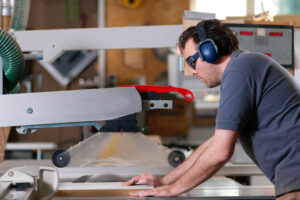Winter is a wonderful season filled with crisp air, holiday cheer, and comfy indoor get-togethers. However, the nippy months also bring unique challenges for your ears and the health of your hearing. Whether you’re dealing with the bitter cold, blustery winds, or increased risk of illness, safeguarding your hearing becomes essential.
For people who rely on hearing aids, winter poses added concerns, but with a few hands-on measures, you can safeguard your hearing and hearing aids throughout the season.
The impact of winter on hearing and hearing aids
Winter’s cold temperatures and severe conditions can impact your ears and hearing devices in a number of ways. Identifying these risks can help you take the necessary steps to safeguard your hearing health.
Greater risk of ear infections
Winter weather often triggers ear infections as a result of temperature fluctuations and increased exposure to inside germs. Moisture inside of your ear can, when exposed to cold air, cool down quickly leaving your ears more susceptible to an infection. The danger of respiratory illnesses is also increased by spending more time indoors, heightening exposure to germs, bacteria, and viruses.
Cold weather and moisture risks for hearing aids
Hearing aids are sensitive to moisture, and winter weather has plenty of potential hazards. Snow, rain, and even condensation from cold air can lead to malfunctions or damage. A hearing aid’s functionality and lifespan can be adversely affected if the delicate electronics are compromised by moisture.
Dry air and ear canal aggravation
The outdoor winter air tends to be dry and inside air can also be dry due to heating systems. In the winter, the skin of your ear canal can dry out causing itching, flaking, and general discomfort.
Guidelines to protect your hearing this winter
Fortunately, a few simple strategies can help decrease the impact of winter on your ears and hearing aids. You will keep your hearing aids in optimum condition and you will be more comfortable by putting these strategies into practice.
Keep your hearing aids safe and dry
In order to maintain your auditory stimulation, it’s essential that you wear your hearing aids daily, even if it’s rainy or snowy.
Here are some key ways to protect them:
- Consider using a protective cover or sleeve for your hearing aids to safeguard them from snow and wind.
- Use a dehumidifying storage compartment overnight to get rid of any moisture.
- Avoid exposing hearing aids to rapid temperature changes, as this can cause condensation.
Continue to be active socially
Winter isolation can be tempting, but staying socially active is vital for your hearing health. Your brain’s auditory processing will remain strong and active by participating in conversation and going to social events. Even basic activities like meeting friends for coffee or watching a movie can boost cognitive function and hearing retention.
It’s important to maintain good ear hygiene
During the winter, it’s important that you keep your ears clean and dry.
The following are a few tips to help you do just that:
- Carefully dry your ears with a towel after exposure to moisture.
- Avoid using cotton swabs, which can pack wax deeper into the ear canal and raise the risk of injury.
- Utilize a soft cloth and warm water to clean around the ear opening if necessary.
Protect your ears by managing your winter illnesses
Since colds and flu are prevalent in winter, take extra care to avoid infections that can impact your ears:
- Consider getting a flu vaccine and wearing a mask in crowded inside spaces if necessary.
- In order to decrease your exposure to germs, wash your hands frequently.
- Support your immune system by maintaining a healthy diet and staying well hydrated.
For advice personalized to your needs, contact us
Reach out to us for a consultation if you’ve noticed any issues with your hearing aids, ear discomfort, or regular ear infections. We will get your hearing aids winter-ready, provide personalized solutions, and assess any concerns you might have. Minor issues can be identified early before they escalate allowing you to be ready for the challenges of the season.
Call us today to schedule an appointment.
[blogcta]





